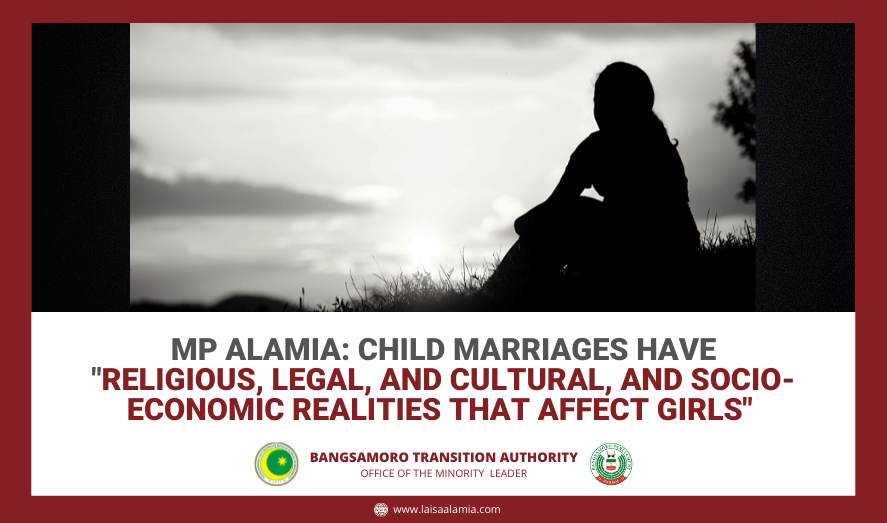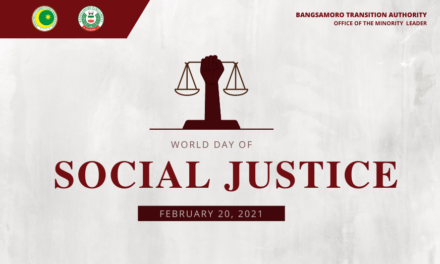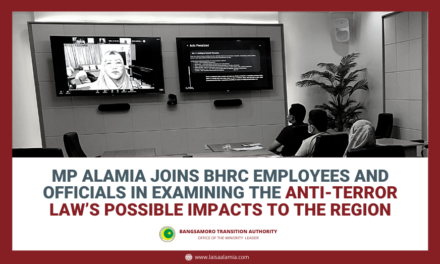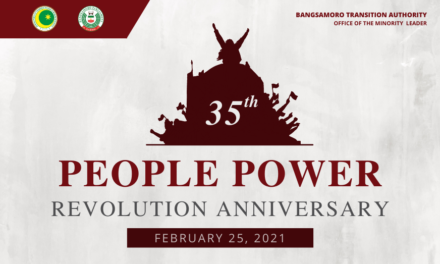In a landmark move for children’s rights, Republic Act No. 11596 or the “Prohibition of Child Marriage Law” was signed into law on Dec. 10, 2021.
“The State recognizes the role of women in nation-building and shall therefore protect and promote their empowerment. This entails the abolition of the unequal structures and practices that perpetuate discrimination and inequality,” RA 11596 states in its declaration of policy.
However, in the Bangsamoro Parliament, “questions of Autonomy and Religious Freedom” were raised by MP Anna Tarhata Basman against the passage of the said law. Minority Floor Leader MP Laisa Alamia set the record straight as she asked clarificatory questions, after having heard the speech which she described as “very heavy speech that tackled a sensitive matter.”
Child brides in the Bangsamoro sought help via regional VAWC hotline
Citing a study conducted by the Bangsamoro Women Commission (BWC) last year, MP Alamia noted that “approximately 88,600 child brides were married off in the BARMM in 2021, and 33% of them have actually asked help through the RBWC’s violence against women hotline.”
Based on these figures, at least 29,000 girl children married before the age of 18 were victims of violence against women and children.
MP Alamia said that “this is the other side of the coin, where we try to protect the right of Muslims to get married at the age of 12 while there are girl children – 88,600 of them in 2021 – who have suffered, with 33% actually asking for help from the BWC.”
The BWC also said that this “traditional practice” which is deemed “a religious practice based on [MP Basman’s privilege] speech” is common not just among the Bangsamoro Muslims but also among indigenous communities.
The practice is compounded with “religious, legal, and cultural dimensions, with socio-economic realities that affect girls,” said MP Alamia.
Real reason for appeal against anti-child marriage law
MP Alamia sought to clarify the real reason behind MP Basman’s apprehension against the newly–passed law as articulated in her privilege speech, which a number of parliament members of parliament have expressed support for.
When MP Alamia asked if MP Basman’s position is “that this law that was passed at the national level that prohibits child marriages affects our autonomy,” and “that the [Prohibition of Child Marriage] law violates the religious freedom of the Muslims in the country,” MP Basman answered in the affirmative.
“Is it also her opinion,” MP Alamia asked, “that there is a different definition as to who is a child in Islam compared to the definition of the child under Philippine laws and, I suppose under international laws and other countries?”
Upon confirming MP Basman’s stand, MP Alamia raised “that the age of marriage in Malaysia is 18 for the males and 16 years old for the females,” to which MP Basman agreed that “there are Muslim countries whose age of marriage are 18 and whose exemptions therefrom are permissible through certain channels.”
“Malaysia is a predominantly Muslim country, as well as Indonesia, Kingdom of Saudi Arabia, and Turkey, and they have all legislated Muslim personal laws that the age of marriage be 18 years old,” MP Alamia said.
“Considering that the proponent has said that this law that prohibits child marriage as defined by Philippine laws and international law – which sets the age of marriage at 18 years old and above, with exemptions in some predominantly Muslim countries – violates the religious freedom of Muslims,” MP Alamia then asks if they are “talking of the same Muslims that are found also in other countries when we say that this law violates the religious freedom of the Muslims.”
Proper consultation, representation in lawmaking
MP Basman responds by saying that “it might come to a point that we agree that the age of marriage is 18, and we are not excluding that possibility. If there are discussions however to be made about this, it should happen here – same as what happened in the cited predominantly Muslim countries where the discussion occured amongst people who will be directly affected by the law.”
But when MP Alamia asks if “considering the reason why she mentioned that this law violates religious freedom is because there was no proper consultation, the age of marriage that was required under this law which applies to all Filipinos did not go through the proper channel and it is not the Muslims themselves who determined that this should be the age of marriage, am I hearing this right?”
“So the objection is not necessarily on the law prohibiting child marriage,” MP Alamia further questioned, “but the objection is because it is not the Muslims themselves who determined what should be prohibited and what should not be prohibited when it comes to child marriage?”
MP Basman, however, responds that the need for proper consultation and representation is “not the argument for the infringement of religious freedom” in her speech. Instead, she then refers to “issues of morality.”
Child marriage is a human rights violation
Prior to the passage of the law, the Philippine Commission on Women has said that “the passage of the law at the Senate level and the numerous filings of the counterpart measures at the House of Representatives reflect Congress’ firm resolve to carry out the Implementing Rules and Regulations of the Magna Carta of Women and uphold our state commitments under international laws, including the above mentioned CRC and CEDAW.”
In a statement issued by United Nations Children’s Fund (UNICEF) Philippines Representative Oyunsaikhan Dendevnorov lauding the passage of the law as a “major milestone for child rights, child marriage is described as “a human rights violation that can result in a lifetime of suffering not just for young girls but for their children as well.”
“Girls who marry before turning 18 are less likely to remain in school and more likely to experience domestic violence and abuse,” according to Dendevnorov. “Compared to women in their 20s, they are also more likely to die due to complications in pregnancy and childbirth. If they survive pregnancy and childbirth, the likelihood of their infants to be stillborn or die in the first month of life is quite high.”
According to the latest figures from Girls Not Brides, a diverse network of civil society organisations working to end child marriage around the world, the Philippines ranks 10th in the world in terms of the number of women below 18 years old who are married or in a union. The number is at 808,000.








